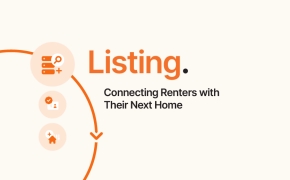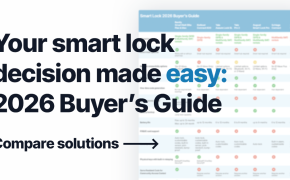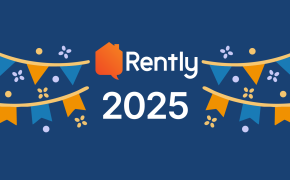With current economic headlines concerning rental property owners, operational budgets are tightening in response. Therefore, some may not see reasons to invest in smart home technology right now.
However, whether times are boom or bust, successful real estate operators thrive by identifying and leveraging positive market trends.
One such trend getting noticed is the demand-driven deployment of smart home technology across single family and multifamily rental properties nationwide.
More and more, portfolio managers are learning that investing in smart home technology is a good idea, especially in tough economic markets. In fact, those investments can actually unlock new revenue streams and create sustainable property value.
Smart Investing is Key
Rental consumers use smart home technology to search for properties, and 82% of renters desire at least one smart home device in their home.
Similarly, leasing staff have also recognized that smart technology can help them accomplish everyday tasks and streamline their operations.
The challenge is to convince property owners – who are a little further away from the “action” – to make investments in smart home property technology, especially in a tight economy.
To better understand the benefits of investing now, Rently offers the following reasons to invest in smart home technology.
Reason 1: Invest in a Rewarding Market Trend
Smart devices remain very popular among consumers even as part of our everyday home life. By the end of 2022, the United States will have 41.3 million existing smart homes, with 77.1 million projected by the end of 2025.
A relatively new push to integrate innovative technology products with traditional real estate assets has created a new and thriving market, often referred to as “proptech” (property technology). Proptech can be a piece of hardware or SaaS product, or even a combination of the two.
In the next decade, the proptech market in North America will grow at a combined annual growth rate of 16%, from the current $18.2 billion to $86.5 billion. Everybody is buying proptech!
As we can see from this data, the proptech segment of the housing market is definitely poised to overcome the current down cycle in the real estate market. Furthermore, within the proptech market, smart home technology proves to be a real “brightspot” for real estate investors.

Reason 2: Invest to Improve Property Management
Investing in smart home technology has a positive impact on leasing activities. Indeed, for years, real estate industry entrepreneurs have pointed out the benefits of integrating technology and property management.
As early as the property listing phase, smart home technology accelerates leasing by enabling self-guided tours. Properties listed with a self-guided touring option generate greater interest among renters. Moreover, tours increase by 40% with Rently’s self-guided touring option. More tours increase the chances for lease signings and reduces a property’s time on the market.
Furthermore, surveys show that 83% of renters prefer to view a property on their own and 40% prefer to view a property outside of regular business hours. Apartments.com recently provided data to show a 63% increase in demand for self-guided tours since 2020.
With Rently’s smart home solution, properties can immediately offer self-touring.
The self-showing property can then be presented on Rently Listings (one million visitors annually!) or on Apartments.com, with whom Rently has an integration partnership. Renters can schedule self-guided tours directly from those listing sites.
It’s easy to see how investing in smart home technology innovates operations. It eases stress on leasing teams stretched by today’s staffing shortages. Leasing staff are grateful for proptech investments. Happier staff usually result in better managed properties and less employee turnover.
To learn more about how smart home technology optimizes the entire leasing lifecycle, read our recent blog.
Reason 3: Invest to Ensure Maximum Tenancy
Once smart home technology has optimized property operations, the investment benefits quickly extend to a property’s income-generating potential. Many surveys have shown that today’s tech-savvy renters desire and are willing to pay more for smart home technology.
On average, renters are willing to pay $37.65 more in rent every month for smart homes. Given that, property owners can quickly recoup their initial investments in smart home technologies.
In addition to the up-charging potential of smart home technology, it can also reduce costly unit turnover expenses by attracting high-quality renters, who tend to lease longer.
Property owners who invest in smart home technology soon reap financial rewards as they attract high quality residents, experience high tenancy rates and enjoy lease renewals.

Reason 4: Invest to Streamline Property Maintenance
Owners with a high level of maintenance activity on their property should also consider investing in smart home technology.
Without a smart access solution, leasing staff must meet with vendors onsite to provide them with physical property keys. A lot of time is spent coordinating back and forth to find available meeting times. If calendars don’t sync, project delays occur.
Simply by installing smart locks on unit doors, maintenance vendors gain convenient access to units to complete work orders faster.
With Rently, residents can use their smart home app to report issues right away, expediting work orders. Then, managers can immediately assign a work order and provide vendors with entry codes to access the unit. Expedited maintenance workflows satisfy residents, and satisfied residents renew leases.
In addition to serving current residents, smart property access accelerates the “make ready” process. The faster units can be serviced for residency, the less time a unit lingers vacant.
With Rently’s smart access solution, all work orders and related details are saved in an activity log that is accessible to property owners at any time they wish to review or track maintenance events.

Reason 5: Invest to Lower Utility Costs
Perhaps the most compelling reason to invest in smart home technology is the ability to save money from better utility management.
On average, smart home devices can reduce utility bills by 30% – a welcome discount as economic pressures cause consumers to focus on savings and find any possible way to offset higher rental rates.
A recent Greystone renter survey revealed that the smart thermostat is the most popular smart home device, with 70% of renters responding that they won’t rent a unit without one.
By deploying smart thermostats on their properties, operators can meet this growing market demand. Meanwhile, they’ll also benefit from a smart thermostat’s capability of monitoring individual HVAC systems for timely replacements.
Better utility management is also becoming a priority for property owners due to the growing attention to ESG (Environment, Social, Governance) scores, which can be relevant to property sales.
Reason 6: Invest to Protect Assets
Smart home technology investments support a property owner’s number one priority – asset protection.
An unsecured property is always at risk. Moreover, during tight economic times, it’s wise to take preventative steps to avoid extra expenses related to property damage.
Smart locks, smart sensors, smart alarms, and video doorbells are the most effective smart home technologies to ensure property security. Rently’s smart lock solution incorporates top-tier physical locks. These smart locks are made out of tamper-resistant materials with alarms that sound if someone enters an incorrect access code. Should a property breach occur, Rently sends immediate desktop and mobile device notifications to property managers or residents.
Similarly, Rently’s smart access solution can also help to secure a property’s common areas, such as pools, gyms, and conference rooms. Smart access panels that require guest entry codes to access these spaces create extra security.
Rently’s smart technology solution incorporates the highest level of security across all physical and digital property access points and has achieved the highest industry benchmark certification for security (SOC2 – Level 2). For more information about Rently’s smart home technology security features, read our recent blog.
In addition to securing your property, smart home technology can also help property owners avoid the extra costs related to fire or water damage. Smart leak sensors and smart smoke/CO2 alarms often keep small property issues from turning into larger, more costly ones. As an added bonus, investing in smart home devices can result in up to a 20% reduction in insurance premiums.
Whether to prevent property intrusions or minimize the costs of normal property usage, investing in smart home technology offers a pro-active and effective way to protect property assets and avoid unnecessary costs.
Reason 7: Invest to Increase Property Value
It’s easy to see all of the long-term benefits of investing in smart home technology. But, how do these investments play out if a property owner might want to sell a property?
The answer depends on the same return-on-investment considerations discussed above. Both buyers and sellers benefit from the value generated by smart home technology.
Already in 2016, a Coldwell Banker survey revealed that 45% of buyers want properties with smart technology, and 54% of sellers plan to install smart home technology to help them sell faster. Interestingly, the National Association of Home Builders (NAHB) has even gone so far as to observe that properties without smart home technology will be worth less in the long run.
However, property owners should be cautioned before investing to consider the technical flexibility of a smart home technology solution. Property owners want to choose a solution that integrates easily with those of future property owners. For instance, Rently’s smart home technology solution uses an open API system that easily integrates with other property management platforms.
Whether now or in the future, property owners should not fear that their investments in smart home technology will have anything other than a positive impact on the current and resale value of their property.
Conclusion
Smart home technology solutions provided an operational lifeline during the recent pandemic.
Now, smart home technology offers ways to counter new economic headwinds. By investing in smart home technology, portfolio owners can lower costs, generate revenue, and add value.
Sooner or later, most properties will be smart properties. With the above reasons to invest in smart home in mind, operators would be wise to invest now and capture as many gains as possible.





